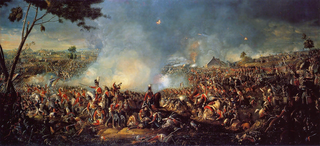
The Battle of Waterloo was fought on Sunday 18 June 1815, near Waterloo, marking the end of the Napoleonic Wars. A French army under the command of Napoleon was defeated by two armies of the Seventh Coalition. One of these was a British-led force with units from the United Kingdom, the Netherlands, Hanover, Brunswick, and Nassau, under the command of the Duke of Wellington. The other comprised three corps of the Prussian army under Field Marshal Blücher; a fourth corps of this army fought at the Battle of Wavre on the same day. The battle was known contemporarily as the Battle of Mont Saint-Jean in France and La Belle Alliance in Prussia.

The 1810s was a decade of the Gregorian calendar that began on January 1, 1810, and ended on December 31, 1819.

1815 (MDCCCXV) was a common year starting on Sunday of the Gregorian calendar and a common year starting on Friday of the Julian calendar, the 1815th year of the Common Era (CE) and Anno Domini (AD) designations, the 815th year of the 2nd millennium, the 15th year of the 19th century, and the 6th year of the 1810s decade. As of the start of 1815, the Gregorian calendar was 12 days ahead of the Julian calendar, which remained in localized use until 1923.

1814 (MDCCCXIV) was a common year starting on Saturday of the Gregorian calendar and a common year starting on Thursday of the Julian calendar, the 1814th year of the Common Era (CE) and Anno Domini (AD) designations, the 814th year of the 2nd millennium, the 14th year of the 19th century, and the 5th year of the 1810s decade. As of the start of 1814, the Gregorian calendar was 12 days ahead of the Julian calendar, which remained in localized use until 1923.

The Regency era of British history is commonly described as the years between c. 1795 and 1837, although the official regency for which it is named only spanned the years 1811 to 1820. King George III first suffered debilitating illness in the late 1780s, and relapsed into his final mental illness in 1810; by the Regency Act 1811, his eldest son George, Prince of Wales, was appointed prince regent to discharge royal functions. When George III died in 1820, the Prince Regent succeeded him as George IV. In terms of periodisation, the longer timespan is roughly the final third of the Georgian era (1714–1837), encompassing the last 25 years or so of George III's reign, including the official Regency, and the complete reigns of both George IV and his brother and successor William IV. It ends with the accession of Queen Victoria in June 1837 and is followed by the Victorian era (1837–1901).
This article presents lists of the literary events and publications in 1815.

The Hundred Days, also known as the War of the Seventh Coalition, marked the period between Napoleon's return from eleven months of exile on the island of Elba to Paris on 20 March 1815 and the second restoration of King Louis XVIII on 8 July 1815. This period saw the War of the Seventh Coalition, and includes the Waterloo Campaign and the Neapolitan War as well as several other minor campaigns. The phrase les Cent Jours was first used by the prefect of Paris, Gaspard, comte de Chabrol, in his speech welcoming the king back to Paris on 8 July.

The Napoleonic era is a period in the history of France and Europe. It is generally classified as including the fourth and final stage of the French Revolution, the first being the National Assembly, the second being the Legislative Assembly, and the third being the Directory. The Napoleonic era begins roughly with Napoleon Bonaparte's coup d'état, overthrowing the Directory, establishing the French Consulate, and ends during the Hundred Days and his defeat at the Battle of Waterloo. The Congress of Vienna soon set out to restore Europe to pre-French Revolution days. Napoleon brought political stability to a land torn by revolution and war. He made peace with the Roman Catholic Church and reversed the most radical religious policies of the Convention. In 1804 Napoleon promulgated the Civil Code, a revised body of civil law, which also helped stabilize French society. The Civil Code affirmed the political and legal equality of all adult men and established a merit-based society in which individuals advanced in education and employment because of talent rather than birth or social standing. The Civil Code confirmed many of the moderate revolutionary policies of the National Assembly but retracted measures passed by the more radical Convention. The code restored patriarchal authority in the family, for example, by making women and children subservient to male heads of households.

HMS Bellerophon, known to sailors as the "Billy Ruffian", was a ship of the line of the Royal Navy. A third-rate of 74 guns, she was launched in 1786. Bellerophon served during the French Revolutionary and Napoleonic Wars, mostly on blockades or convoy escort duties. She fought in three fleet actions: the Glorious First of June (1794), the Battle of the Nile (1798) and the Battle of Trafalgar (1805). While the ship was on blockade duty in 1815, Napoleon boarded Bellerophon so he could surrender to the ship's captain, ending 22 years of almost continuous war between Britain and France.
The year 1815 in science and technology involved some significant events, listed below.

The Waterloo campaign was fought between the French Army of the North and two Seventh Coalition armies, an Anglo-allied army and a Prussian army. Initially the French army had been commanded by Napoleon Bonaparte, but he left for Paris after the French defeat at the Battle of Waterloo. Command then rested on Marshals Soult and Grouchy, who were in turn replaced by Marshal Davout, who took command at the request of the French Provisional Government. The Anglo-allied army was commanded by the Duke of Wellington and the Prussian army by Field Marshall Graf von Blücher.

Basque Roads, sometimes referred to as Aix Roads, is a roadstead on the Biscay shore of the Charente-Maritime département of France, bounded by the Île d'Oléron to the west and the Île de Ré to the north. The port of La Rochelle stands at the northeast corner of the roads, and the town of Rochefort is near the mouth of the river Charente to the south.
Nationality words link to articles with information on the nation's poetry or literature.
Events from the year 1817 in the United Kingdom.
Events from the year 1816 in the United Kingdom.
Events from the year 1778 in Great Britain.

The Duchess of Richmond's Ball was a ball hosted by Charlotte Lennox, Duchess of Richmond in Brussels on 15 June 1815, the night before the Battle of Quatre Bras. Charlotte's husband Charles Lennox, 4th Duke of Richmond, was in command of a reserve force in Brussels, which was protecting that city in case Napoleon Bonaparte invaded.

Rear-Admiral Sir Frederick Lewis Maitland was an officer in the Royal Navy during the French Revolutionary and Napoleonic Wars. He rose to the rank of rear admiral and held a number of commands. The most famous event of his career occurred when Napoleon Bonaparte surrendered to him aboard HMS Bellerophon, marking the final end of the Napoleonic Wars.
The Field of Waterloo is a poem by Walter Scott, written and published in 1815. It is in iambic tetrameters and trimeters with a few Spenserian stanzas at the end. The work moves from a depiction of the site of the battle, with farm life renewing in the autumn, to an account of the conflict, highlighting Napoleon and Wellington, and a roll-call of prominent British casualties.
Lieutenant-Colonel Henry Percy was a British Army officer. Having served as Aide-de-camp of Duke of Wellington at the Battle of Waterloo, he brought the news of the victory to London.














